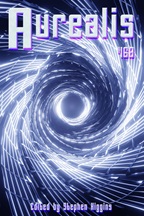“Hell Is Other People” by Michael Pryor
“The Temple of the Hungry Moon” by L B Hazelthorn
“All Quiet in the Calabast Night” by Andrew Kao
Reviewed by Victoria Silverwolf
Three tales of fantasy appear in this issue.
“Hell Is Other People” by Michael Pryor is one of a series of stories narrated by a demon on Earth. In this adventure, he is trapped by an evil man in a modern, high-tech version of a pentagram. The man intends to use the demon to kill dozens of women, already having murdered four on his own. The demon has to find a way out, and to give the man a taste of his own medicine.
To some extent, this is a puzzle story, with the reader trying to figure out how the demon will escape. The solution is logical, if not very interesting. Other than that, most of the appeal of the story comes from the narrator’s sardonic, cynical style, resembling that of a hardboiled detective.
In “The Temple of the Hungry Moon” by L B Hazelthorn, priests worship a shapeshifting, flesh-eating creature as a god. When the ambassador of a king arrives in an attempt to convince the god to move to the king’s city, the being reveals its own desires.
The story consists of several short, numbered sections of text, creating an impressionistic effect. There is very little plot, and the work is best appreciated for the exotic, subtly horrific mood it creates.
“All Quiet in the Calabast Night” by Andrew Kao takes place in a fantasy world where one nation has conquered and colonized another. The narrator is the adult child of one of the victorious soldiers. The narrator makes use of the ability of the conquered people to control dreams as a profession. When father and child pay a visit to another soldier, who abuses the conquered persons he keeps as servants, the narrator must use this skill to heal a young boy’s trauma and to punish the soldier for his crimes.
This is a grim tale, containing child abuse, post-traumatic stress disorder, and a particularly gruesome form of revenge. Sensitive readers should take its content warning seriously. One scene reveals the fact that the father has the ability to produce flames from his body, but this plays no part in the plot. Perhaps this is meant to be symbolic of his emotional turmoil, but I found it out of place.
Victoria Silverwolf is currently reading Harry Harrison’s novel Make Room! Make Room!, which was loosely adapted into the film Soylent Green.
 Aurealis
Aurealis